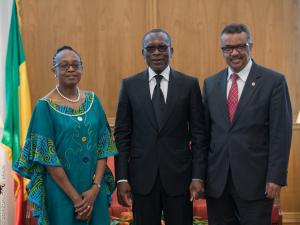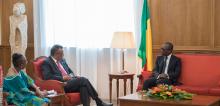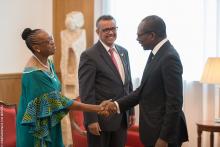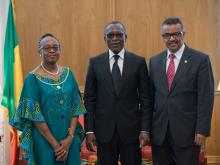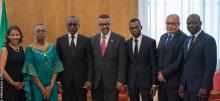Maximising digital health technology to improve quality and patient safety in Africa
Cotonou, Benin 19 June 2018 - The World Health Organization(WHO) has urged countries to maximise the use of digital health technology to improve patient safety and equitable access to quality health care. Dr Tedros Adhanom Gebreyesus, the Director-General of the World Health Organization made the call while addressing delegates attending the second International Conference of Ministers of Health and Ministers for Digital Technical Technology on Health Security in Africa (CIMSA). The event has attracted over 300 delegates including the participation of Ministers of Health, Ministers of ICT, WHO Regional Director for Africa, Dr Matshidiso Moeti, development partners and telecoms companies.
Every year, millions of patients die or are injured because of unsafe and poor-quality health care. Most of these deaths and injuries are totally avoidable. Adverse events due to medical errors are now estimated to be the 14th leading cause of death and injury globally, putting it in the same league as tuberculosis and malaria. There are an estimated 421 million hospitalizations in the world every year, and on average, 1 in 10 result in adverse events due to poor health care.
“The needless suffering of patients and their families is bad enough. But each adverse event erodes the most precious resource in health care: trust. Medical errors aren’t just bad medicine; they’re bad economics. The economic costs of medical errors are astronomical and the investments needed to improve patient safety pale into insignificance compared with the costs of harm”, said Dr Tedros.
The Director-General pointed out that electronic health records, the use of smart phones and smart watches, electronic medical prescriptions, artificial intelligence, eLearning, and many other existing digital technologies can play a vital role in improving patient safety, raising awareness, training health care professionals and empowering patients and families. He called for committed leadership both at the national level and individual health facility level, clear policies and governance mechanisms, and data-driven improvements - including full implementation of health data standards and full use of available data for decision-making.
Speaking during the opening of a panel discussion on “Enhancing the collaboration between the Ministries of Health and ICT on e-Health in Africa", the WHO Regional Director for Africa, Dr Matshidiso Moeti said: Digital solutions are the future of equitable, quality health care and resilient health systems and over the past years, great strides have been made in boosting telemedicine, eLearning, mHealth and social media in the African region”.
Comprehensive and up-to-date repositories of digital solutions have been put in place by WHO to assist countries to make better decisions. Together with the International Telecommunications Union (ITU), the World Health Organization has implemented an mHealth programme called “Be Healthy Be Mobile” which is helping to alleviate noncommunicable diseases in the region.Similarly mobile applications are being used as part of the Ebola outbreak in the Democratic Republic of Congo to collect and transmit contact tracing and alert data. The launch of an electronic portal using geographic information management systems now allows all partners to have access to epidemiological data, information on entry points and health infrastructures, thus allowing a better understanding of the dynamics of the current Ebola virus epidemic.
Dr Moeti however urged countries to take firm action to address the unregulated spread of digital solutions that have no chance of being scaled up to benefit the wider population, as it leads to wastage of resources “Collaboration between the health, information and communication technology and other sectors is essential to improve access to health care, patient safety and the achievement of universal health coverage”, she added.
Email: agossouf [at] who.int (agossouf[at]who[dot]int)
Communications and marketing officer
Tel: + 242 06 520 65 65 (WhatsApp)
Email: boakyeagyemangc [at] who.int (boakyeagyemangc[at]who[dot]int)



